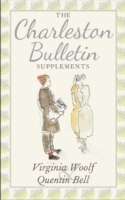The Charleston Bulletin Supplements

Editorial The British Library
Fecha de edición junio 2013 · Edición nº 1
Idioma inglés
EAN 9780712358910
144 páginas
Libro
encuadernado en tapa dura
Resumen del libro
In the summer of 1923 Virginia Woolf's nephews, Quentin and Julian Bell, started a family newspaper, The Charleston Bulletin. Quentin decided to ask his aunt Virginia for a contribution: 'it seemed stupid to have a real author so close at hand and not have her contribute.' Woolf joined forces with Quentin, and from 1923 until 1927 they created fully-fledged booklets of stories and drawings that were announced as Supplements. Written or dictated by Woolf and illustrated by Quentin, these Supplements present a unique collaboration between the novelist during her most prolific years and the child-painter.
In Virginia Woolf, Quentin Bell not only found a professional author and an experienced journalist, but, above all, a close companion and conspirator who shared his irreverence and mischievous sense of humour. The Supplements are transcribed in full here for the first time alongside around 40 of Bell's original illustrations. Designed to tease the adults, they portray Bloomsbury eccentricities along with the foibles and mishaps of the residents and visitors at Charleston.
This is the first time the Supplements have been published since they were first written and will therefore be welcomed by fans of Woolf and her circle.
Biografía del autor
(1882 1941) aprendió a leer en casa gracias a la biblioteca familiar. Luego se convirtió en una de las escritoras más importantes de nuestro tiempo: crítica y ensayista, diarista y autora de una extensa correspondencia, novelista y, desde luego, lectora. También fue editora, y ¿Cómo debería leerse un libro? es quizá su texto más célebre sobre lo que ocurre con los libros una vez que caen en manos de quien los lee.








